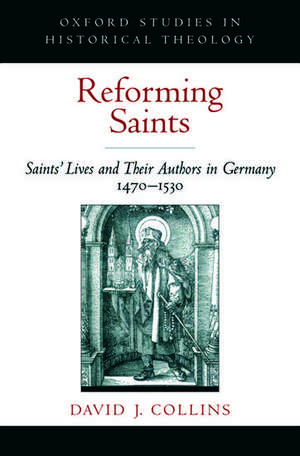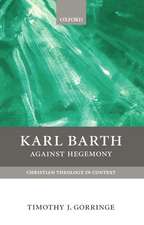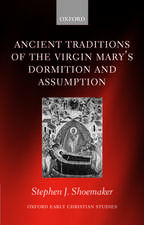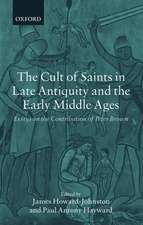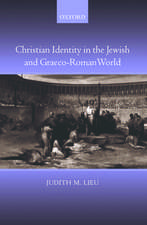Reforming Saints: Saints' Lives and Their Authors in Germany, 1470-1530: Oxford Studies in Historical Theology
Autor David J. Collinsen Limba Engleză Hardback – 21 feb 2008
Din seria Oxford Studies in Historical Theology
- 18%
 Preț: 642.63 lei
Preț: 642.63 lei - 17%
 Preț: 204.45 lei
Preț: 204.45 lei - 27%
 Preț: 448.52 lei
Preț: 448.52 lei - 27%
 Preț: 445.14 lei
Preț: 445.14 lei - 12%
 Preț: 561.42 lei
Preț: 561.42 lei - 13%
 Preț: 558.34 lei
Preț: 558.34 lei - 27%
 Preț: 370.44 lei
Preț: 370.44 lei - 30%
 Preț: 519.06 lei
Preț: 519.06 lei - 13%
 Preț: 617.95 lei
Preț: 617.95 lei - 13%
 Preț: 557.52 lei
Preț: 557.52 lei - 13%
 Preț: 559.15 lei
Preț: 559.15 lei - 23%
 Preț: 752.71 lei
Preț: 752.71 lei - 28%
 Preț: 444.12 lei
Preț: 444.12 lei - 30%
 Preț: 498.25 lei
Preț: 498.25 lei - 15%
 Preț: 543.19 lei
Preț: 543.19 lei - 13%
 Preț: 662.18 lei
Preț: 662.18 lei - 22%
 Preț: 498.66 lei
Preț: 498.66 lei - 24%
 Preț: 490.43 lei
Preț: 490.43 lei - 13%
 Preț: 558.34 lei
Preț: 558.34 lei - 14%
 Preț: 674.35 lei
Preț: 674.35 lei - 26%
 Preț: 576.27 lei
Preț: 576.27 lei - 30%
 Preț: 629.69 lei
Preț: 629.69 lei - 30%
 Preț: 685.97 lei
Preț: 685.97 lei - 27%
 Preț: 647.16 lei
Preț: 647.16 lei - 30%
 Preț: 580.08 lei
Preț: 580.08 lei - 30%
 Preț: 715.04 lei
Preț: 715.04 lei -
 Preț: 337.34 lei
Preț: 337.34 lei - 30%
 Preț: 551.68 lei
Preț: 551.68 lei - 30%
 Preț: 628.48 lei
Preț: 628.48 lei -
 Preț: 274.69 lei
Preț: 274.69 lei -
 Preț: 287.56 lei
Preț: 287.56 lei - 28%
 Preț: 646.49 lei
Preț: 646.49 lei - 25%
 Preț: 661.43 lei
Preț: 661.43 lei - 28%
 Preț: 473.21 lei
Preț: 473.21 lei -
 Preț: 323.95 lei
Preț: 323.95 lei - 22%
 Preț: 449.95 lei
Preț: 449.95 lei - 24%
 Preț: 633.56 lei
Preț: 633.56 lei -
 Preț: 321.01 lei
Preț: 321.01 lei - 12%
 Preț: 380.55 lei
Preț: 380.55 lei - 30%
 Preț: 789.06 lei
Preț: 789.06 lei - 31%
 Preț: 905.97 lei
Preț: 905.97 lei - 11%
 Preț: 341.80 lei
Preț: 341.80 lei - 30%
 Preț: 533.02 lei
Preț: 533.02 lei - 31%
 Preț: 934.71 lei
Preț: 934.71 lei - 30%
 Preț: 553.30 lei
Preț: 553.30 lei - 13%
 Preț: 689.29 lei
Preț: 689.29 lei - 31%
 Preț: 876.91 lei
Preț: 876.91 lei
Preț: 499.43 lei
Preț vechi: 714.66 lei
-30% Nou
Puncte Express: 749
Preț estimativ în valută:
95.57€ • 100.03$ • 79.54£
95.57€ • 100.03$ • 79.54£
Carte tipărită la comandă
Livrare economică 19-25 martie
Preluare comenzi: 021 569.72.76
Specificații
ISBN-13: 9780195329537
ISBN-10: 0195329538
Pagini: 246
Ilustrații: 9 b/w line illus.
Dimensiuni: 235 x 156 x 19 mm
Greutate: 0.54 kg
Ediția:1
Editura: Oxford University Press
Colecția OUP USA
Seria Oxford Studies in Historical Theology
Locul publicării:New York, United States
ISBN-10: 0195329538
Pagini: 246
Ilustrații: 9 b/w line illus.
Dimensiuni: 235 x 156 x 19 mm
Greutate: 0.54 kg
Ediția:1
Editura: Oxford University Press
Colecția OUP USA
Seria Oxford Studies in Historical Theology
Locul publicării:New York, United States
Recenzii
This is an extremely valuable and carefully documented contribution to German religious history.
David Collins has provided a deeply-nuanced and compelling analysis of the intersection of medieval hagiography, humanist scholarship, and reforming agendas in Germany during the generations of Erasmus and Luther. In the process, he illuminates complex relationships between the devotional pieties of, on the one hand, the late middle ages, and, on the other, the reformations of the sixteenth century. This excellent book will be of interest to students of both medieval and early modern Christianity.
In this brilliantly structured and meticulously researched study, Collins demonstrates the compelling interest of saints' lives authored by a range of northern intellectuals. Steering deftly between the Scylla of Erasmus's acclaimed life of St. Jerome and the Charybdis of Luther's equally acclaimed mockery of the saints, Collins recovers the fascinating, nuanced contexts of hagiographic composition in the liminal period 1470-1530. The four central chapters bring to life holy bishops, eccentric hermits, patriotic authors, and demanding patrons. Anyone with an interest in how medieval devotions survived Europe's passage to modernity will want to read this book.
David Collins has provided a deeply-nuanced and compelling analysis of the intersection of medieval hagiography, humanist scholarship, and reforming agendas in Germany during the generations of Erasmus and Luther. In the process, he illuminates complex relationships between the devotional pieties of, on the one hand, the late middle ages, and, on the other, the reformations of the sixteenth century. This excellent book will be of interest to students of both medieval and early modern Christianity.
In this brilliantly structured and meticulously researched study, Collins demonstrates the compelling interest of saints' lives authored by a range of northern intellectuals. Steering deftly between the Scylla of Erasmus's acclaimed life of St. Jerome and the Charybdis of Luther's equally acclaimed mockery of the saints, Collins recovers the fascinating, nuanced contexts of hagiographic composition in the liminal period 1470-1530. The four central chapters bring to life holy bishops, eccentric hermits, patriotic authors, and demanding patrons. Anyone with an interest in how medieval devotions survived Europe's passage to modernity will want to read this book.
